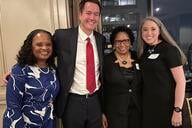You have /5 articles left.
Sign up for a free account or log in.
It is contrary to human nature to be concise. We yearn to be understood (alas, much more than to understand). Communication, however, is hindered by many factors, from limited vocabulary to the befuddling effects of physical and mental stress to the implicit biases held by our audiences, as well as ourselves. Add to that the practice ingrained in all of us from grade school onward to support our thinking with myriad details, and it is no wonder that our tendency is to overexplain.
This is one of the reasons why the work of copyediting is often so difficult. It’s emotional business. Editing someone else’s effort to be understood feels personal and not a little disrespectful. But it’s also imperative because too many words create barriers to understanding and functionality. Especially on the web.
On higher education websites, we should be doing better on this front. We’ve been discussing writing for the web for 15 years or more. The “wall of text” has its own meme. We’ve even created a text abbreviation for webpages we’ll never finish (tl;dr). I would like to think that there is some general awareness that content for the web must be formatted differently and be more succinct in order to be effective. So why are college and university websites still awash in words?
One theory I’m entertaining is that we haven’t prepared our web editors to edit and we haven’t empowered them to do so.
Praise for the College Web Editor
College web editors are a disparate bunch. They may be full professors, resident directors, administrative assistants, adjunct instructors, fundraisers or program managers. On the surface, it may seem they share very little in common except their bravery in accepting responsibility for updating college webpages (or their misfortune in being assigned that responsibility!) and some level of comfort with technology.
But they also share another very important quality: they are helpers. Everyone in the department knows their web editor. At one time or another, they have asked their web editor for help in posting a new program description or cropping a head shot or formatting the new employee welcome email, and the web editor has happily done so because that’s the kind of person they are.
Unfortunately, a lot of this work is happening with no questions asked, and frankly, it may be time for web editors to become a little less accommodating.
From Helpers to Strategic Partners
Like I said, I think the vast majority of web editors have cultivated knowledge over the years about what makes one webpage more effective than another, but wading into an editor’s role might still feel uncomfortable due to the natural deference they have for their peers. So how do we give them license to unlock the full potential of their abilities? How do we help our web editors make the leap from editing web pages to editing content?
1.) Give them time.
The immediacy of the web can be a quality killer. The French philosopher and mathematician Blaise Pascal famously wrote, “I would have written a shorter letter, but I did not have the time.” Yes, Sarah, the nice web editor in the dean’s office, could publish the 1,500 words she was given on the new degree program in 24 hours, but imagine what she could do if she had a week.
Preparing content for the web is an exercise in demolition and renovation. It is fully absorbing the information, excising half of it and then completely reimagining what’s left so that it fulfills its original intent. And that’s just the work on the copy. Then there’s choosing the best layouts in the content management system, adding visual interest to the page, ensuring that keywords are employed deftly so that the new content can be found by search engines and checking for ADA compliance. Expecting a quick turnaround could mean the difference between posting information that serves your audience and goals or posting just another page people won’t read and can’t find.
2.) Build editorial into the process.
I’ve written previously about COVID-19 FAQ content that due to its timely nature had to be “thrown” on the web, but 98 percent of web content at a college or university should be thoughtfully published. Our academic colleagues who write research papers and books would expect to be edited by a book editor, but not by Omar, the great guy who maintains the departmental website. Maybe there is something we can learn from print production, where editorial work is built into the process.
Copy and layout can sometimes be more interdependent on the web because web readers rely heavily on layout to aid in scannability, but that’s not to say we can’t create a separate space for the back and forth of copyediting. But we could start talking in our user training about copyediting as a distinct and separate step in getting content on the website. That way, web editors know it’s not inappropriate to flip an edited Word document back to a colleague with revised copy for her input before ever logging into the CMS to post that content on the web.
3.) Support them.
As natural as it is to overexplain, it’s just as natural to resist being edited. Web editors will need support in the face of some honest reactions to the slash-and-burn methods that sometimes accompany web editing. Make sure they are in the habit of talking about the audience and goals so that they can help their colleagues drill down to the essence of their messages. Arm them with metrics and data as well as examples of good web content that they can hold up to demonstrate results. Help them to identify and edit out passive voice in their content. Most importantly, if you’re in a marketing position, let them consult with you, lean on you and maybe even paint you as the bad guy in difficult conversations so that our content contributors can begin to expect editing and to trust that it is in their best interests.
College Web Editors and Websites Evolving
The centrality of the web to nearly every aspect of the college experience goes without saying, but even some 25 years later, colleges and universities have yet to invest in web communications professionals at any level nearing appropriate. The decentralized method of web content production, represented by massive content management systems with hundreds of daily users, is here to stay. Luckily it has captured the curiosity of a group of passionate people for whom web communications was never a career goal but who are the lifeblood of most .edu domains.
The editorial process involves refining communications. Little is lost and much is gained by taking the time to sharpen the language of a blog post or web content. While content editing is yet another responsibility to add to an already bloated position description, it’s also the next step in the evolution of college and university websites where craft is applied at deeper and deeper levels of the organization. Web communications expertise is thriving outside the web team and the marketing department because we’ve spent years proselytizing about it to our editor communities. I think they would welcome the opportunity to take up the mantle if given the right support.
Donna Lehmann is the assistant vice president for marketing at Fordham University in New York City.




